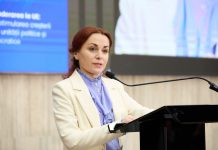Revolutions, staged successions and consolidated authoritarianism replaced elections” in practically all the post-Soviet countries. Against such a background the best news from Moldovas recent elections is the lack of any other event but the election results. In the last decade, it is practically the first change of government through contested elections where the governing party goes into opposition after the counting of the votes, not street protests (Moldova managed a similar transfer of power through elections in 2001 when the Communist came into power after elections). These last years Moldovas political system was highly centralized (and less pluralistic than Ukraines). And still Moldova is the only CIS country with an uninterrupted cycle of legal and constitutional transfers of power through elections since its independence in 1991. The pendulum of power is swinging with great difficulties but without interruption, while in all other post-Soviet states the pendulum has either stopped for now, or has been terribly dysfunctional. This is an almost surprising achievement for a state that is rural, semi-depopulated, has a separatist conflict and the lowest GDP per capita in Europe (yes, lower than Albanias).
Selections vs elections
For the last decade, post-Soviet states have developed three types of managing transitions of power. None of these included elections”:
-The first is the model of not transfering power at all. This is the case of Belarus, Azerbaijan and the Central Asian stans” (with the partial exception of Kyrgyzstan);
-the second model is project successor”, where an incumbent president passes power to a chosen successor who is then confirmed through popular selections” (as opposed to elections”). Russia was the first one to do that (first with Eltsin transferring power to Putin in 2000, and then Putin appointing Medvedev as president in 2008 in a hybrid scenario of succession” and consolidated authoritarianism” models). Armenia managed successfully a project successor” from Kocharyan to Sargsyan in February 2008. And Ukraines Kuchma tried, but failed, in 2004.
-The third model was to challenge the rulers on the street through coloured revolutions” taking place after fake elections. In Ukraine the Orange Revolution thwarted Kuchmas project successor”, while Georgias Rose Revolution dethroned Shevardnadze. In Georgia and Ukraine și the street protests, not the elections as such lead to a change in power. In Georgia and Ukraine, fake elections sparked protests (and the revolutions”), but protests, not elections caused transfers of power.
Thus, the most wide-spread model of transfers of power through elections seems NOT to be modus operandi of post-Soviet elites. Against such a background, Moldovas elections come as a surprise.
Moldovas Alliance for European Integration”
Today, the four Moldovan (former) opposition parties și Lib-Dems, Liberals, Democrats and Our Moldova alliance și have agreed to create a governing coalition that will push the Communist party into opposition (I explained the Moldovan political landscape here). The name of the coalition is Alliance for European Integration”. Its key priorities are the dismantling of the vertical of power”, rule of law, real implementation (as opposed to declarative implementation”) of Moldovas commitment vis-Ã -vis the EU, European integration and strategic partnerships with Russia and the US. The Alliance has a very narrow majority of 53 deputies out of 101, while the Communists have 48 (52 votes are needed to elect the speaker and prime minister, and 61 votes to elect the new president).
The press-conference of the four party leaders was quite dull and uninspiring. They read their coalition agreement and took questions. None of them looks terribly impressive or persuasive as politicians who can lead and energize voters. Vlad Filat (Lib-Dems) and Lupu (Democrats) are technocrats with very good teams of professionals in their parties (and Filat seems to be a good talent-manager”), Urecheanu (Our Moldova”) was bitter against the Communist, and Ghimpu (Liberals) who is perceived to be the more nationalist party spoke Russian at the press conference which was a good sign of openness.
But the good news is that they seem serious and non-euphoric. All seem to understand how difficult it will be to govern Europes poorest state in times of an economic crisis and with such a narrow majority. There is no Orange- or Rose Revolution style euphoric mood. The four parties need to elect a new president which will be impossible without having the support of at least 8 Communist MPs. The Communists can decide to block the election of the new president, which will mean that Voronin will stay on as acting president until new (early) elections next year (the hope is that disunity and the economic crisis will damage the new government opening the way for a comeback for the Communists).
A newly elected deputy also tells me that he will have to forget about trips to Europe (in delegations or for conferences) , because the majority in the parliament is so narrow. If one or two persons leave, the coalition might not be able to pass laws. That is a bit of a paradox since Moldova will need a lot of external support that will need to be mobilized through an active diplomacy at all levels. And many of the new MPs are among the best people that can represent Moldova abroad.
In any case all, Moldovan political parties are enmeshed in heavy multilateral horse-trading. It will last for another two months minimum, if not another three-four years. This is possible, but the Communist have accepted publicly their defeat and even suggested they might vote for a new president (at the end of the day Voronin was re-elected as president in 2005 with the support of a dozen opposition deputies, including many current MPs from the Democratic and Liberal Democratic parties). It is sure that the Communist will make the life of the new government as difficult as possible. Being the biggest party in parliament, having control of most media-resources in Moldova and being the richest political party (and economic centre of power) this will not be difficult. But they have not tried to use blatantly authoritarian means to stay in power. In this sense they also seem less brutally post-Soviet than most other post-Soviet governing cliques. While in the opposition the Communists have a chance to reform, modernise and start prepare for a post-Voronin era bringing younger people to the forefront (this process partly started already).
Moldova as Central Europe in the 90s?
Not really and not yet. But Central Europe in the 90s provides a good selection of cases that are worth comparing with Moldova today. Slovakia is one. In the 90s Slovak politics was dominated by Vladimir Meciar, a rather authoritarian ruler (though Slovakia in the 90s was more pluralist than Moldova in the last eight years, primarily due to more pluralistic media, a more sophisticated society, more developed civil society and a smaller concentration of economic power). Meciar left after loosing elections in 1998, and the new prime-minister Dzurinda brought Slovakia into the EU through a set of successful reforms.
Romania is another example. In 1996 Romanias president Ion Iliescu (and his reformed Communists și the Party of Social Democracy) lost elections. In 1996-2000 an extremely messy coalition of democratic forces (the Democratic Convention) muddled through, rather than governed. But against the background of political scandals and economic crisis under the Democratic Convention și most have missed that politics, media and the economy in Romania became irreversibly decentralised. When Ion Iliescu and (PDSR) came back into power in 2000, democracy, free media, political pluralism, and alternative centres of economic power in Romania were irreversibly established.
Obviously every countrys transition from socialism to democracy had its unique set of models and circumstances (and many countries do not even pretent to be in transition”). All transitions are sui generis. At this stage Moldova is strengthening its break from the typically authoritarian post-Soviet governance models, and might be evolving towards the messier style of Central European politics in the 90s. It has no obvious Dzurinda who would accelerate and implement successfully a European reform agenda, and most importantly it does not have an EU accession perspective. Politics will almost inevitably be incredibly messy. The most likely scenario is a combination of Ukrainian-style political chaos and Romania in the 90s”-style of de-monopolisation of political and economic power. But political chaos is not bad in itslef. Latvia changed 9 governments between 1994 and 2004, but when it comes to reforms, Latvia is light-years ahead of countries like Ukraine or Moldova, let alone the stable” Belarus or Azerbaijan. What matters in Moldova is that elections matter” (meaning that governments can be changed through elections ) and that is so far a structural factor.
The Communists (reformed or not) might be back in power one, four or eight years; or they might disintegrate as a party when Voronin retires. What matters at this stage for Moldova is to drastically, quickly and irreversibly de-monopolise the political and economic system of the country. Moldova is not yet Central Europe”, but has so far managed to avoid a typically authoritarian post-Soviet model of political and economic power that makes elections irrelevant.






